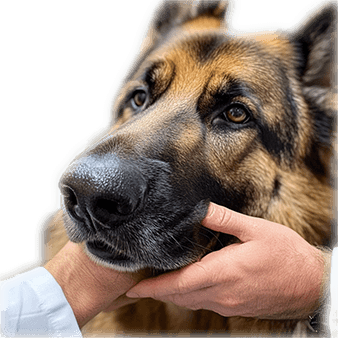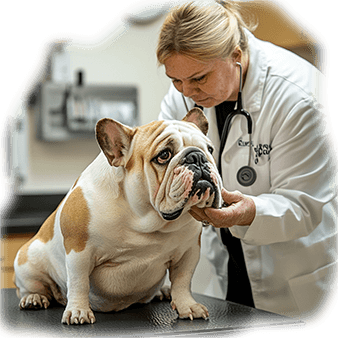German Shepherd Health: A Comprehensive Guide to Keeping Your Dog Healthy
German Shepherds are known for their intelligence, loyalty, and versatility. Whether they’re working as service dogs, police dogs, or beloved family companions, German Shepherds have unique health needs that every owner should be aware of. This breed is prone to certain genetic and physical health issues that require proactive care and attention. In this guide, we’ll explore common health concerns in German Shepherds and provide helpful tips for keeping your dog in optimal condition.
Common Health Issues in German Shepherds
German Shepherds are generally healthy dogs, but they are predisposed to a few specific conditions due to their genetics and physical structure. Understanding these potential problems will help you take preventive measures and seek timely veterinary care if needed.

Hip Dysplasia
One of the most common health problems in German Shepherds is hip dysplasia. This is a genetic condition where the hip joint does not fit properly into the hip socket, leading to pain, arthritis, and mobility issues over time.
- Symptoms – Watch for signs such as difficulty getting up, reluctance to jump, limping, or stiffness in the hind legs. These may become more noticeable after exercise or as your dog ages.
- Prevention and Care – Although hip dysplasia is partly genetic, you can help reduce its impact through weight management and regular low-impact exercise. Swimming, walking, and short hikes are great for building muscle without putting excessive stress on the joints. You can also talk to your vet about joint supplements such as glucosamine and chondroitin, which may support joint health.
- Treatment – In severe cases, surgery may be required to correct hip dysplasia. Early diagnosis through X-rays and regular vet check-ups is crucial for managing the condition effectively.
Degenerative Myelopathy
Degenerative myelopathy is a progressive neurological disease that affects the spinal cord, leading to weakness and eventual paralysis in the hind legs. It is most common in older German Shepherds.
- Symptoms – Early signs include wobbling when walking, dragging the hind feet, and difficulty standing. Over time, the condition worsens, leading to complete paralysis of the hind limbs.
- Prevention and Care – There is no cure for degenerative myelopathy, but you can help manage the condition through physical therapy and exercise. Low-impact activities like swimming can maintain muscle strength and mobility for as long as possible. Some vets may recommend the use of a mobility cart to assist dogs in later stages.
- Treatment – Unfortunately, there is no known cure for this disease. However, maintaining your dog’s quality of life through physical therapy, regular vet care, and supportive devices can make a difference.
Bloat (Gastric Dilatation-Volvulus)
Bloat, or gastric dilatation-volvulus (GDV), is a life-threatening condition that occurs when the stomach fills with gas and twists. This cuts off the blood supply to the stomach and other vital organs, leading to rapid deterioration.
- Symptoms – Signs of bloat include a distended abdomen, excessive drooling, restlessness, and unsuccessful attempts to vomit. If your German Shepherd shows any of these symptoms, it is a medical emergency, and you should seek immediate veterinary care.
- Prevention – To help prevent bloat, feed your dog smaller meals throughout the day rather than one large meal. Avoid vigorous exercise before and after meals, as this can increase the risk of bloat. Additionally, using elevated feeding bowls may help reduce the amount of air your dog swallows while eating.
- Treatment – Bloat requires emergency surgery to untwist the stomach. If not treated quickly, it can be fatal. Many owners of high-risk breeds like German Shepherds opt for a preventive surgery called gastropexy, which attaches the stomach to the abdominal wall to prevent twisting.

Arthritis
As German Shepherds age, they are prone to developing arthritis, particularly if they have joint issues like hip dysplasia. Arthritis causes pain, stiffness, and reduced mobility, which can greatly affect your dog’s quality of life.
- Symptoms – Common signs of arthritis include difficulty getting up, reluctance to move, limping, and a decrease in activity levels. You may also notice your dog is stiff after resting.
- Prevention and Care – Managing your dog’s weight is one of the best ways to reduce the risk of arthritis. Keeping your dog at a healthy weight reduces strain on the joints. Regular, gentle exercise like walking or swimming can also help maintain joint mobility and strength. Additionally, many dogs benefit from joint supplements such as omega-3 fatty acids and glucosamine.
- Treatment – If your German Shepherd develops arthritis, your vet may prescribe pain medications or anti-inflammatory drugs to manage the condition. In more severe cases, physical therapy, acupuncture, or laser therapy may help alleviate discomfort.
Skin Allergies
German Shepherds are prone to skin allergies, which can cause itching, redness, and hair loss. These allergies may be triggered by environmental factors (such as pollen or dust mites), food sensitivities, or flea bites.
- Symptoms – Look for signs of excessive scratching, licking, or biting at the skin, particularly around the paws, face, and ears. You may also notice red or inflamed skin, hair loss, or scabs.
- Prevention and Care – Regular grooming (Amazon affiliate link) can help remove allergens from your dog’s coat, particularly during allergy season. If food is the trigger, work with your vet to find a hypoallergenic diet that suits your dog’s needs. Flea prevention is also crucial—use flea control products regularly to prevent infestations.
- Treatment – Depending on the severity of the allergy, your vet may recommend antihistamines, medicated shampoos, or dietary changes. In some cases, allergy testing may be necessary to pinpoint the specific cause.
Preventive Care Tips for German Shepherds
Prevention is key to maintaining your German Shepherd’s health. Regular veterinary visits, proper nutrition, and exercise can go a long way in preventing common health problems.
- Routine Vet Visits – Annual or bi-annual check-ups allow your vet to catch potential health issues early, making treatment more effective.
- Diet and Weight Management – Feed your German Shepherd a balanced diet (Amazon affiliate link) that’s appropriate for their age, size, and activity level. Overweight dogs are more likely to develop joint problems, heart disease, and other health issues. Provide your dog with supplements to support your dog’s immune system (Amazon affiliate link), joints, heart, skin, and digestive health.
- Exercise – German Shepherds are a high-energy breed that needs regular physical activity. Aim for at least an hour of exercise a day, including walks, playtime, or agility training. Try using a pet safe harness (Amazon affiliate link) to help controll pulling, thus reducing stress on the dog’s body.
- Vaccinations and Parasite Prevention – Keep your dog’s vaccinations up to date, and use flea, tick, and heartworm preventatives as recommended by your vet.

Monitoring Your German Shepherd’s Health
Being aware of changes in your dog’s behavior or physical condition is essential for early detection of health problems. Keep an eye out for the following red flags:
- Changes in appetite or drinking habits
- Lethargy or lack of interest in activities
- Difficulty moving, limping, or stiffness
- Excessive scratching, licking, or grooming
- Sudden weight gain or loss
- Changes in bowel movements or urination patterns
If you notice any of these signs, it’s important to consult your vet as soon as possible.

Final Thoughts
German Shepherds are an incredible breed, known for their strength, intelligence, and loyalty. However, they also have specific health concerns that require proactive care. By staying informed and taking preventive measures, you can help your German Shepherd live a long and healthy life. Regular vet visits, a proper diet, and a balanced exercise routine will go a long way in keeping your dog in peak condition. If you notice any signs of common health issues, early diagnosis and treatment can make all the difference in your dog’s quality of life.
Remember, a healthy dog is a happy dog—and your German Shepherd deserves the best care you can give.
Further reading: “The Complete Guide to German Shepherds: Selecting, Training, Feeding, Exercising, and Loving your new German Shepherd Puppy” (Amazon affiliate link) by David Daigneault.
Affiliate Disclosure
This post may contain affiliate links, which means I earn from purchases made through links. Please see the privacy policy page for more details.






